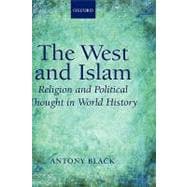
Note: Supplemental materials are not guaranteed with Rental or Used book purchases.
Purchase Benefits
What is included with this book?
| Glossary | p. xiv |
| Abbreviations | p. xv |
| Introduction | p. 1 |
| Religion and Politics: The West, Islam, Byzantium | p. 11 |
| Religious and political spheres and authorities | p. 11 |
| Original differences | p. 11 |
| Early Christianity | p. 11 |
| Early Islam | p. 13 |
| Convergence between the West and Islam | p. 15 |
| Sultan and 'ulama | p. 22 |
| Return to original positions | p. 26 |
| Separation of church and state in the West | p. 28 |
| Modern Islam | p. 30 |
| Political participation | p. 33 |
| Revolutionary eschatology | p. 34 |
| Holy war | p. 35 |
| Persecution, toleration | p. 37 |
| Legitimacy: The Caliphate and the State | p. 43 |
| The origins and purpose of coercive jurisdiction | p. 44 |
| Marsilius of Padua and Ibn Rushd | p. 51 |
| The responsibilities of caliphate and state | p. 57 |
| Abstract political concepts | p. 59 |
| Society: Tribe, Commune, and Nation | p. 65 |
| The family | p. 65 |
| Women | p. 66 |
| Feudalism | p. 66 |
| Communes | p. 67 |
| Nation | p. 68 |
| Church and 'umma | p. 69 |
| Classes | p. 71 |
| Regimes: Europe, Islam, and Byzantium | p. 76 |
| Monarchy | p. 76 |
| Justice and law | p. 81 |
| Law and the king | p. 83 |
| Religious constitutionalism | p. 85 |
| How to deal with a bad ruler | p. 89 |
| The people | p. 94 |
| Practical Politics | p. 101 |
| Managerial politics | p. 103 |
| Might and right | p. 104 |
| Ibn Khaldun, Machiavelli, Marx | p. 107 |
| Approaches to Political Thought | p. 112 |
| The effects of religious differences | p. 112 |
| Narrative and abstract | p. 113 |
| The influences of Plato and Aristotle | p. 116 |
| Attitudes to philosophy and reason | p. 117 |
| Islam's rejection of philosophy | p. 121 |
| European renaissance | p. 124 |
| Revival of philosophy in twelfth-century Europe | p. 126 |
| Changes in Religion and Politics | p. 133 |
| The first European revolution | p. 133 |
| The city republics | p. 138 |
| Sunni consolidation | p. 139 |
| Revolutionary Shi'ism in Iran | p. 142 |
| The Origins of Western Political Thought | p. 145 |
| Natural law | p. 146 |
| Liberty | p. 149 |
| The state | p. 150 |
| Theory and practice | p. 151 |
| Approaches to political thought (continued) | p. 152 |
| Conclusion | p. 154 |
| Epilogue: The West, Islam, Russia | p. 157 |
| The Influences of the West | p. 159 |
| Conclusion | p. 163 |
| Marsilius and Ibn Rushd | p. 166 |
| Bibliography | p. 168 |
| Primary sources | p. 168 |
| Secondary sources | p. 170 |
| Index | p. 181 |
| Table of Contents provided by Ingram. All Rights Reserved. |
The New copy of this book will include any supplemental materials advertised. Please check the title of the book to determine if it should include any access cards, study guides, lab manuals, CDs, etc.
The Used, Rental and eBook copies of this book are not guaranteed to include any supplemental materials. Typically, only the book itself is included. This is true even if the title states it includes any access cards, study guides, lab manuals, CDs, etc.